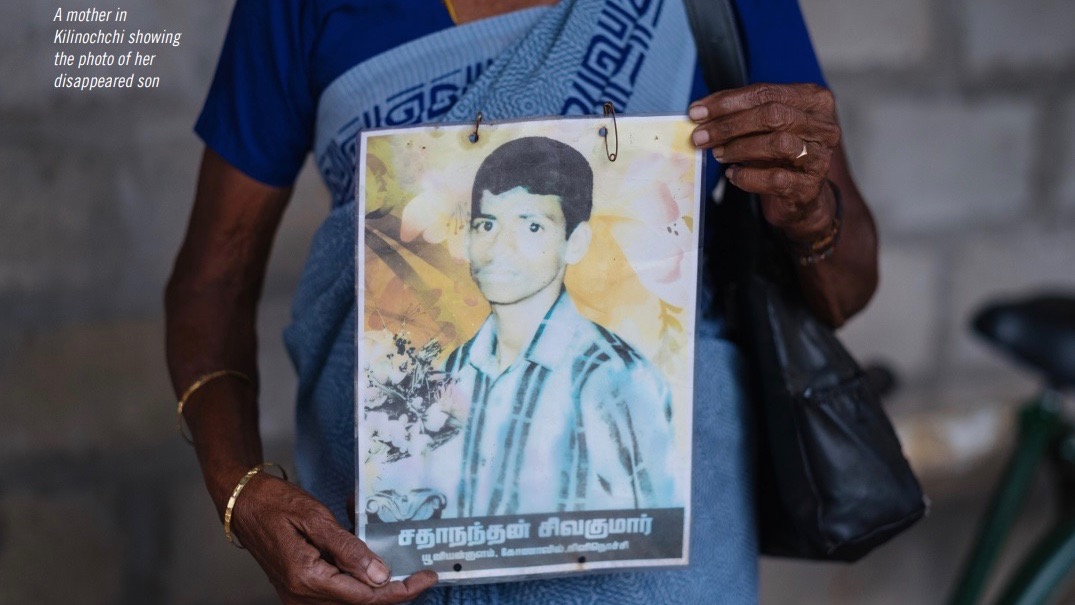Families of victims of enforced disappearance in Sri Lanka are facing a surge in surveillance, intimidation and harassment by the state authorities. The country has the second-largest number of enforced disappearance cases in the world. However, the present dispensation led by president Gotabaya Rajapaksa is showing reluctance to facilitate justice, reparation and accountability.
The whereabouts of tens of thousands of Sri Lankans from all ethnic communities continue to remain unknown. Even those representing disappeared persons have faced the brunt of state scrutiny and detention. The situation remains grim even a year after the United Nations Human Rights Commission passed a resolution over the deteriorating human rights situation in Sri Lanka.
In a 26-page detailed report titled ‘Still no answers: An update on the rights of the victims of the enforced disappearances in Sri Lanka’ released on March 1, Amnesty International confirmed that “at least 60,000 and as many as 100,000 persons have been subjected to enforced disappearances in Sri Lanka since the 1980s.”
Under the tenure of the Gotabaya Rajapaksa government, the rights situation has reportedly declined alarmingly, with several civilians, human rights defenders, minorities, and journalists complaining of facing harassment and structural abuse.
On February 14, 31-year-old Shehan Malaka Gamage, who had been seeking justice over the April 2019 bombings, alleged that members of the Criminal Investigation Department forcibly detained him in Kalutara district’s Panadura.
Even lawyers working on cases of enforced disappearances in the courts have been reportedly threatened with violence and sexual abuse. Noted lawyer Achala Senevirathne alleged that navy officials accused in a case she was involved with telephoned her and threatened her.
“The situation of cases of disappearance is extremely vulnerable… The government’s attitude is that there were no disappearances,” Sandya Eknaligoda, wife of disappeared journalist Prageeth Eknaligoda, stated.
“In February 2022, families of the disappeared in northern Sri Lanka marked five years of continuous protests demanding truth and justice. Over the years and despite countless domestic mechanisms, the Sri Lankan authorities have repeatedly failed to provide them answers and justice,” Amnesty’s report noted.
People participating in demonstrations seeking to know the whereabouts of their missing loved ones have also complained of facing state scrutiny, including the “photographing and video recording their protests, harassment through phone calls and incessant questioning. The authorities now reportedly seek pre-emptive court orders against key activists demanding truth and justice around the disappeared,” the report said.
The UN High Commissioner for Human Rights Michelle Bachelet has called for the imposition of targeted sanctions on alleged Sri Lankan rights violators are in order to pursue justice for international crimes committed in the country through universal jurisdiction.
On March 4, Bachelet noted that the Sri Lankan government should take “further steps to address the fundamental problems with the Prevention of Terrorism Act and undertake deeper legal, institutional and security sector reforms that were critically needed to put an end to impunity and prevent any reoccurrence of past violations.”
“Victims and their families continued to be denied truth and justice,” she added. “I remain concerned by the continued suffering and anguish of victims and families of the disappeared, who call for truth and justice, and seek to commemorate their loved ones.”
Repeated incidents of custodial deaths and killings in alleged armed encounters with the police are also a cause of alarm. “We also continue to receive allegations of ill-treatment and torture by police and military. This highlights the importance of fundamental security-sector reforms,” Bachelet said.





